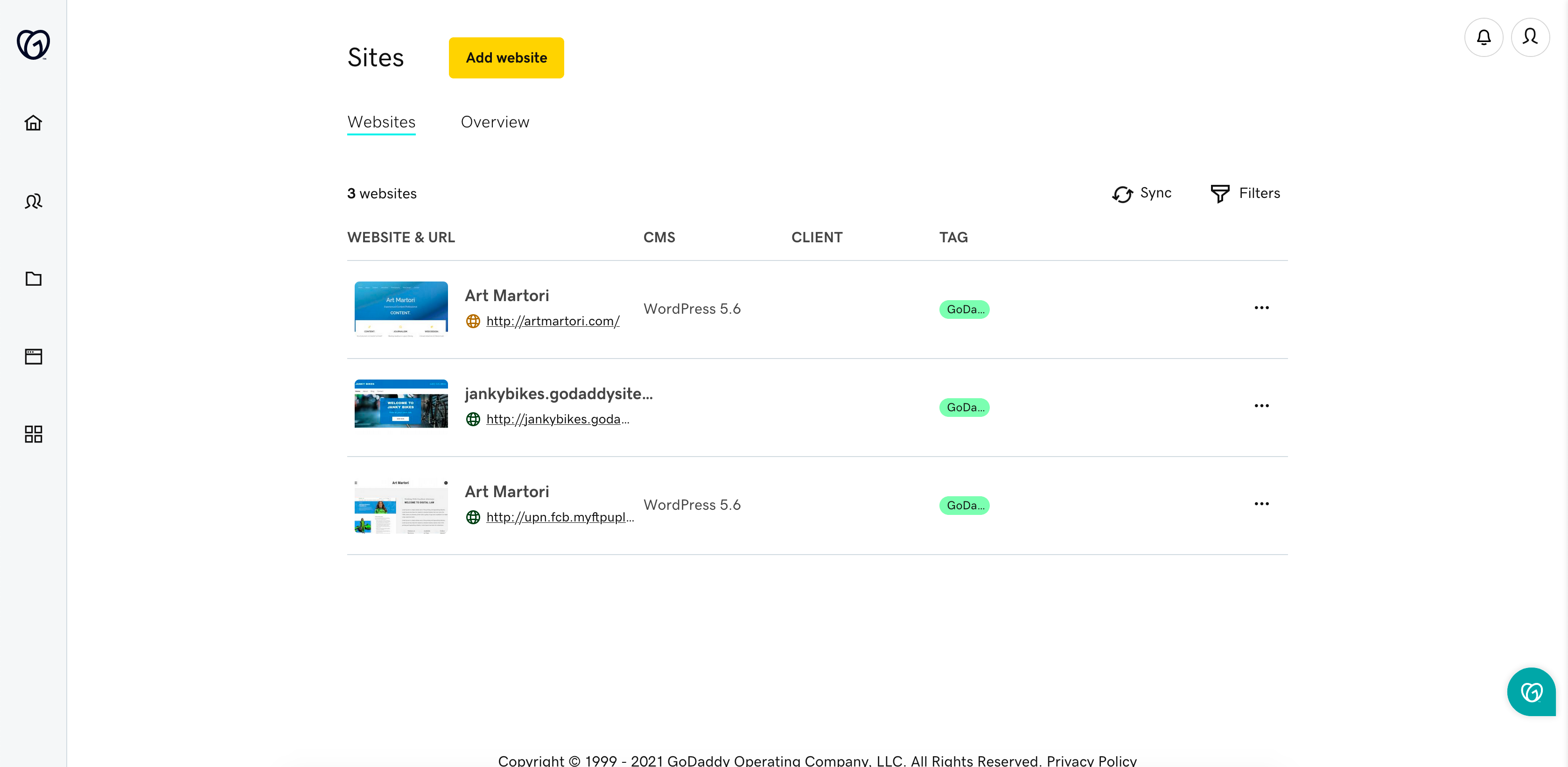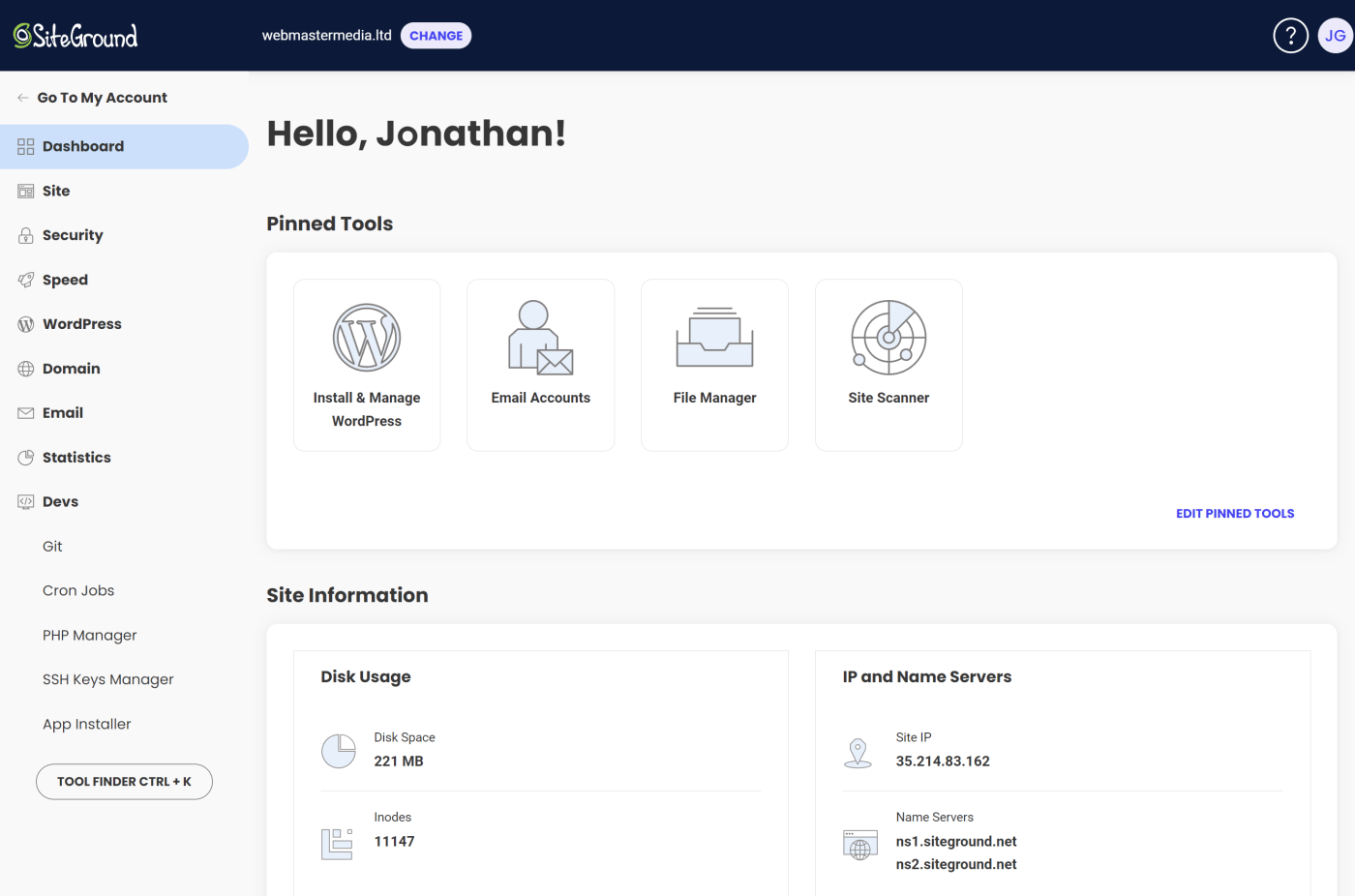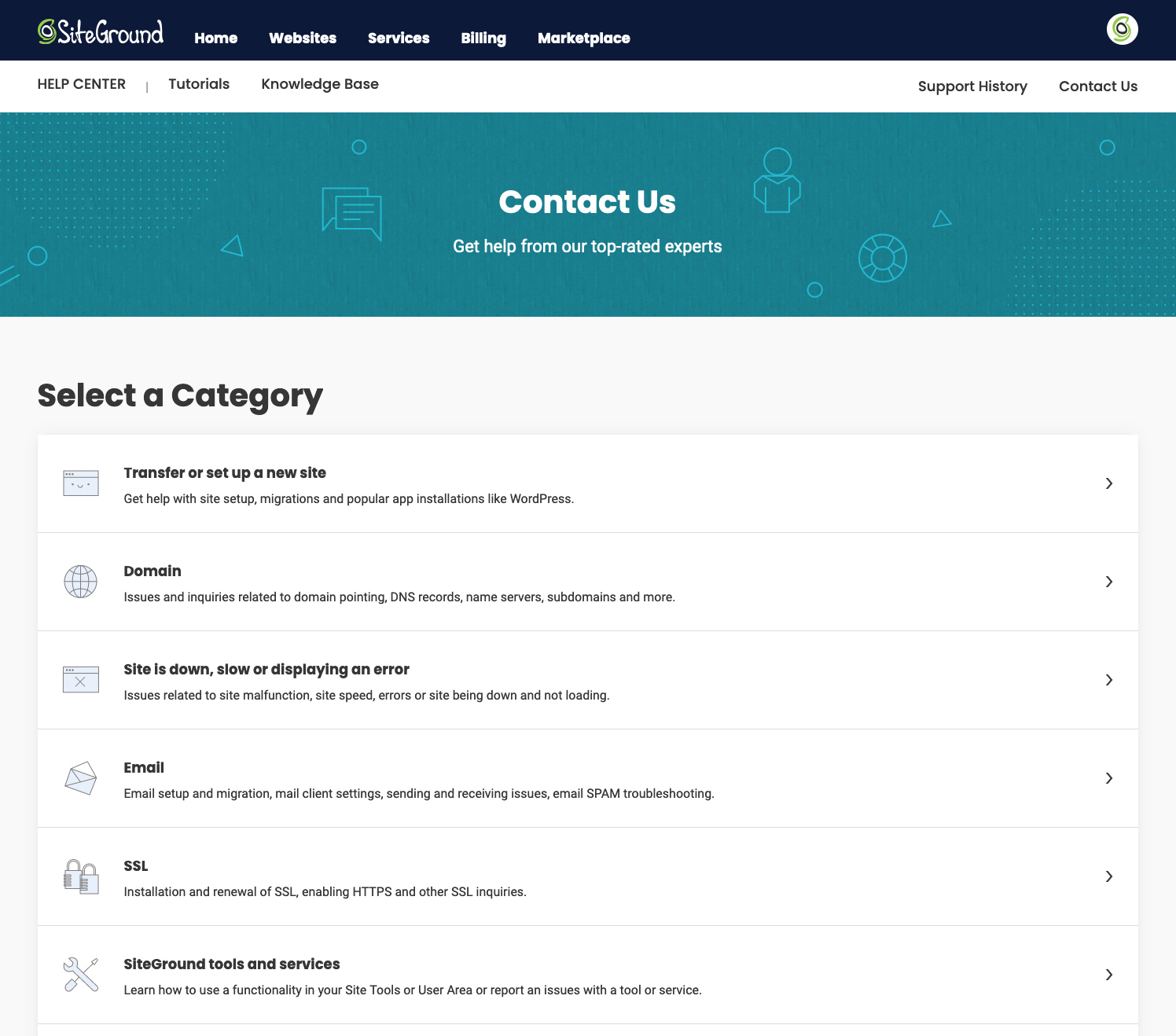Godaddy vs Siteground: Final verdict
Looking over GoDaddy vs. SiteGround, it’s clear why both hosts are so popular. They have both hosted millions of
websites that run on WordPress for decades, building up a loyal customer base.
SiteGround (Overall grade: 8.8)
stands out for its performance metrics and comprehensive feature set. Leveraging premium Google Cloud infrastructure, it ensures faster response times and enhanced scalability. SiteGround offers superior customer support with a high satisfaction rate and provides advanced security measures, such as a smart WAF and AI anti-bot system. While slightly more expensive, the additional costs are justified by the range of features like free CDN, daily backups, and managed WordPress services. Additionally, SiteGround’s user-friendly interface and automation tools make it a great option for both novice and experienced users.
GoDaddy (Overall grade: 7.8)
performs well with solid uptime and decent server response times but falls short in terms of speed and advanced security compared to SiteGround. It’s particularly strong in offering affordable hosting plans, easy-to-use cPanel, and a seamless migration tool for WordPress sites. However, its customer service can be inconsistent, and the frequent upselling and higher renewal costs detract from the overall experience. GoDaddy is a viable choice for budget-conscious users needing basic web hosting, but for those seeking high performance and superior support, SiteGround remains the better option.
 Overall grade:7.8 |
 Overall grade:8.8 |
|
|---|---|---|
| Uptime and Availability | 8.6 | 9.4 |
| Hosting Performance | 8.1 | 8.8 |
| Hosting Security | 8.6 | 8.6 |
| Price | 7.7 | 8.4 |
| Hosting Features | 7.1 | 8.5 |
| Ease Of Setup | 8.7 | 8.9 |
| User Management | 5.0 | 8.4 |
| Customer Support | 8.2 | 9.2 |
| User feedback | 3.9/5 | 4.3/5 |
Hosting types offered
Both platforms provide a variety of hosting types, each designed to meet the different needs of users.
 |
 |
|
|---|---|---|
| Shared hosting | ||
| Cloud hosting | ||
| WordPress hosting | ||
| Ecommerce hosting | ||
| VPS hosting | ||
| Dedicated hosting |
Although both offer a variety of hosting plans tailored to different needs, in
certain cases, one platform may prove to be more suitable.
Detailed comparison
Uptime and availability
Evaluates the average uptime statistics, uptime guarantee and overall availability of the hosting
provider
Score Components:
- Uptime percentage (30%): evaluates the uptime statistics in given period of time
- Uptime guarantee (20%): Assesses if the platform offers an uptime guarantee and
whether the actual uptime matches the promised guarantee. - General performance (25%): Evaluates how fast is the average response time and overall
it’s stability. - Responsiveness (10%): Adaptability to different devices and screen sizes.
- Availability (25%): Reflects the total downtime and number of outages.
 8.6
8.6
 9.4
9.4
🏆 Winner SiteGround: A reliable hosting provider with excellent uptime and superior speed metrics.

SiteGround guarantees a 99.9% uptime and delivers impressively with an actual uptime of 99.99% over two months. This level of reliability is backed by an attractive compensation policy, providing additional monthly hosting credits for any downtime. Performance tests highlight SiteGround’s stability, with an impressive average response time of 0.207 seconds and the ability to handle user traffic without issues.

GoDaddy, on the other hand, offers a 99.9% uptime guarantee and achieved a 99.98% uptime rate during testing over two months. Despite its strong performance and average server response time of 341ms, GoDaddy experiences frequent short downtimes, especially on its WordPress hosting plans. Compensation for any downtime is limited to service credits, which may not be as generous as SiteGround’s offerings.
Choosing between GoDaddy and SiteGround ultimately depends on your specific needs and priorities. If you require superior uptime and faster response times, SiteGround stands out as the more reliable option. GoDaddy still remains a solid choice, especially if your focus is on achieving decent performance at a competitive price.
Which one has better hosting performance?
Score Components:
- Hosting speed (30%): This includes SSD quality, Load times, PageSpeed score ranges,
additional information on website speed, built-in plugins for performance enhancement, available caching
methods, and CPU/RAM options - CDN (20%): Considers whether CDN is available or not, whether it’s free or paid, and
the quality of the CDN service - Available data centers (30%): Evaluates the number of data centers and their locations
globally. - Scalibility (20%): Looks at whether elastic scaling is available, the process required
to scale (manual upgrade vs. automatic scaling), the presence of dedicated servers, and the costs
associated with scaling.
 8.1
8.1
 8.8
8.8
🏆 Winner SiteGround: Superior hosting performance and customer satisfaction.
When comparing the general performance of GoDaddy and SiteGround, several factors stand out. SiteGround’s infrastructure is built on the premium Google Cloud, using SSD persistent storage and the latest technologies like Brotli, HTTP/2, and TLS 1.3. GoDaddy also offers SSDs and uses NVMe storage; however, its speed-enhancing features such as AutoSSL and free SSL certificates aren’t as advanced. Both providers offer built-in caching solutions, but SiteGround goes a step further with its unique SuperCacher service, which integrates with NGINX-based dynamic cache and Memcached service. GoDaddy’s data centers are spread across North America, Europe, and Asia-Pacific, while SiteGround leverages Google Cloud’s vast network, including 170+ CDN edge locations.
Website Speed
Both GoDaddy and SiteGround claim improved website speed, but SiteGround has a distinct advantage with its custom PHP and MySQL setups, leading to a 30% reduction in the time to first byte (TTFB). SiteGround’s Speed Optimizer plugin comes pre-installed for further optimization. GoDaddy also offers fast server response times with its optimized servers but doesn’t provide the same level of fine-tuning out of the box. SiteGround’s integration of static and dynamic caching creates a noticeably faster user experience.
Scalability
In terms of scalability, both GoDaddy and SiteGround offer a range of hosting plans from shared hosting to VPS solutions. With GoDaddy, scaling usually requires plan upgrades, particularly in its VPS and managed WooCommerce plans. SiteGround, on the other hand, offers more fluid scalability owing to the flexible nature of Google Cloud infrastructure, but the exact specifics of elastic scaling aren’t clear-cut. Scaling costs with GoDaddy range from $5.99 to $44.99 per month for shared hosting, whereas SiteGround’s StartUp to Cloud plans start from $3.99 to $100.00 per month. Both provide dedicated servers as a scalability option.
Which one has better security features?
and regulatory requirements
Score Components:
- Technical security measures (40%): This includes encryption, firewalls, DDoS
protection, secure configurations, server monitoring, access control and availability of security addons
(e.g Sitelock security). - Operational security measures (30%): Encompasses data privacy, backups and data
redundancy. - Compliance and certifications (20%): Adherence to legal and regulatory requirements
(e.g., GDPR, HIPAA) and possession of certifications (e.g., ISO 27001, SOC 2). - Business and reliability (10%): Factors in the provider’s reputation, uptime
guarantees, and customer support.
 8.6
8.6
 8.6
8.6
🏆 Winner SiteGround: A robust security suite featuring custom solutions and AI protection.
Technical security measures:
GoDaddy and SiteGround both ensure high levels of security through advanced technical measures. GoDaddy offers a Web Application Firewall (WAF), malware scanning and removal, DDoS protection, and CageFS. On the other hand, SiteGround employs a smart WAF, AI anti-bot system, and multi-layered security in partnership with Google Cloud. Additionally, both provide free SSL certificates, although GoDaddy’s AutoSSL renews automatically, whereas SiteGround uses Let’s Encrypt for the same purpose. GoDaddy offers the latest PHP versions with Zend LTS, while PHP versions for SiteGround are not specified.
Operational security measures:
Both hosting providers offer operational measures to secure their hosting environments. SiteGround offers 24/7 system administration and automatic updates for WordPress and WooCommerce. GoDaddy matches this with 24/7 award-winning customer support via phone and chat, including SMS. SiteGround performs daily automated backups and keeps up to 30 copies, whereas GoDaddy provides daily automatic backups with one-click restore. Both hostings ensure robust operational security but vary slightly in approaches and additional features.
Compliance and certifications:
GoDaddy is fully compliant with GDPR, offering tools to manage user data and privacy policies. PCI-compliance is provided for its specific products like WooCommerce Hosting and GoDaddy Online Store. SiteGround manages data security with encryption and other advanced tools via Google Cloud but does not offer PCI compliant servers.
 |
 |
|
|---|---|---|
SSL certificate |
Free AutoSSL |
Free SSL through Let’s Encrypt |
Additional security features |
WAF, Malware Scanning, DDoS Protection, CageFS |
WAF, AI Anti-Bot System, Multi-layered Security |
PHP versions |
Latest versions with Zend LTS |
Not specified |
GDPR compliance |
Yes |
Yes |
HIPAA compliance |
Not specified |
Not specified |
PCI compliance |
Yes (for specific products) |
No |
Hosting features
Score Components:
- Domains (20%): Assesses the availability of a free domain, domain purchase options, and
pricing - Email (15%): Considers if the provider offers full email hosting, or is reselling
third-party service, and if the email is only transactional or not - Website builder (15%): Checks if website builder is available, and it’s user
friendliness and overall the level of customization allowed. - Staging environment (20%): Determines if a staging environment is available, allowing
for testing changes before going live. - FTP & SFTP accounts (10%): Evaluates if and how easily users can access FTP and
SFTP accounts - Git and SSH access (20%): Assess whether Git is integrated into the hosting service and
if SSH access is provided
 7.1
7.1
 8.5
8.5
🏆 Winner
SiteGround:
A standout hosting provider offering robust and user-friendly features tailored for any level of technical expertise.
GoDaddy and SiteGround both offer a variety of hosting plans, catering to different levels of website needs. GoDaddy is well-known for its affordable and extensive web hosting options, which come with free SSL certificates, free domain for the first year, and free email. Notably, GoDaddy provides a free WordPress migration tool, making it an ideal choice for individuals or businesses looking to switch providers seamlessly. SiteGround, while slightly more expensive, includes additional performance features and a user-friendly interface that’s popular among both beginners and experienced users. SiteGround offers unlimited websites across most plans, prioritizing ease with a free SiteBuilder and providing advanced functionalities like WordPress Staging and automated backups.
GoDaddy’s VPS hosting offers advanced options like root access and unlimited traffic, catering to tech-savvy users seeking more control and high performance. On the other hand, SiteGround emphasizes security and speed, integrating premium Google Cloud services and a custom WAF for enhanced protection. SiteGround’s plans come with managed WordPress services, including autoupdates and performance optimizers, making it a great alternative for WordPress users seeking hassle-free maintenance. GoDaddy provides additional perks such as unmetered bandwidth and 24/7 customer support through multiple channels, while SiteGround boasts a highly responsive and friendly support team with a 98% satisfaction rate.
Hosting Features Comparison
 |
 |
|
|---|---|---|
Free domain |
Yes, for the first year |
Yes, for the first year |
Free SSL |
Yes |
Yes |
Email hosting |
Yes |
Yes |
Website builder |
Limited |
Yes |
Staging environment |
Yes, on higher plans |
Yes |
FTP & SFTP accounts |
Yes |
Yes |
Git and SSH access |
Yes, on VPS plans |
Yes |
Free backup |
Yes, on higher plans |
Yes |
Money back guarantee |
30 days |
30 days |
a location.
As a result in rare cases the features mentioned here can differ from the ones you see on their websites.
Email services:
GoDaddy provides standard email hosting services alongside free email accounts in all its plans, making basic email management easy for small to medium-sized businesses. SiteGround also includes free email hosting across its plans and offers robust security features for email communication. Both providers give options for integrating third-party email services like Google Workspace and Outlook, but SiteGround’s seamless integration and superior customer service make email management a more streamlined experience.
Price
Score Components:
- Plan value (40%): What each pricing tier offers.
- Transparency and clarity (30%): Clearness of pricing structures.
- Flexibility of plans (20%): Range of options to suit different budgets.
- Hidden costs (10%): Additional expenses not included in the plan.
 7.7
7.7
 8.4
8.4
🏆 Winner SiteGround: Direct and competitive pricing with comprehensive features stand out.
Evaluating the pricing of plans among various hosting providers can be complex due to their differing pricing and renewal strategies. Additionally, certain plans require annual commitments, which adds to the difficulty of making comparisons. The prices listed are based on monthly commitments; plans requiring annual commitments are indicated. Additionally, although some providers offer identical plans for WordPress and shared hosting, we have created separate tables for each to enhance clarity.
GoDaddy and SiteGround offer diverse hosting plans that cater to various needs. GoDaddy’s shared hosting plans start at $5.99/mo for the Economy plan, providing 25 GB of storage and 10 databases. Meanwhile, SiteGround starts at $3.99/mo for a similar plan, albeit with a discounted introductory price. SiteGround also provides a free CDN and enhanced security in all its plans, making it a cost-effective option. For WordPress hosting, GoDaddy’s Basic plan starts at $12.99/mo and includes features like a free domain and automated malware scans. SiteGround’s WordPress plans start at $3.99/mo, and they offer free SSL, daily backups, and managed WordPress services across all their plans. Both providers offer substantial features, but SiteGround’s competitive pricing, enhanced security, and additional features give it an edge.
 |
 |
|---|---|
|
Managed WordPress Basic $12.99
1 website, 10 GB storage, free domain, free SSL, WP pre-installed, AI creation tool, weekly backups, web application firewall, automated malware scans & removal. Value for price:7.3
|
StartUp Plan $17.99
1 website, 10 GB web space, ~10,000 visits monthly, unmetered traffic, Free WP installation, auto updates, free SSL, daily backups, free CDN, managed WordPress. Value for price:7.8
|
|
Managed WordPress Deluxe $13.99
1 website, 20 GB storage, free domain, free SSL, WP pre-installed, AI creation tool, daily backups, web application firewall, up to 2x faster performance with CDN, enhanced security with DDoS protection, staging site. Value for price:7.6
|
GrowBig Plan $29.99
Unlimited websites, 20 GB web space, ~100,000 visits monthly, unmetered traffic, free WP migrator, free SSL, on-demand backups, staging, 100% renewable energy match. Value for price:8.0
|
|
Managed WordPress Ultimate $15.99
1 website, 30 GB storage, free domain, free SSL, WP pre-installed, AI creation tool, daily + on-demand backups, web application firewall, 2x faster performance with CDN, enhanced security with DDoS protection, staging site, SEO optimizer, WP code optimizer, smart WP plugin manager, sell online with WooCommerce, priority support. Value for price:8.0
|
GoGeek Plan $44.99
Unlimited websites, 40 GB web space, ~400,000 visits monthly, unmetered traffic, free WP migrator, on-demand backups, free SSL, highest tier resources, priority support, staging + Git. Value for price:8.5
|
 |
 |
|---|---|
|
Web Hosting Economy $5.99
1 website, 25 GB storage, 10 databases, shared RAM and vCPU, free domain and email, free SSL for 1 year, free WordPress migration tool, 30-day money-back guarantee. Value for price:7.0
|
StartUp Plan $17.99
1 website, 10 GB web space, unmetered traffic, daily backup, free SSL, free CDN, free email, ecommerce-enabled, managed WordPress, 30-day money-back guarantee, 100% renewable energy match. Value for price:7.8
|
|
Web Hosting Deluxe $7.99
10 websites, 50 GB storage, 25 databases, shared RAM and vCPU, free domain and email, free unlimited SSL, free WordPress migration tool, 30-day money-back guarantee. Value for price:7.5
|
GrowBig Plan $29.99
Unlimited websites, 20 GB web space, ~100,000 visits monthly, unmetered traffic, 30% faster PHP, free WP migrator, on-demand backups, staging, 100% renewable energy match. Value for price:8.0
|
|
Web Hosting Ultimate $12.99
25 websites, 75 GB storage, 50 databases, shared RAM and vCPU, free domain and email, free unlimited SSL, free WordPress migration tool, 30-day money-back guarantee. Value for price:7.8
|
GoGeek Plan $44.99
Unlimited websites, 40 GB web space, ~400,000 visits monthly, unmetered traffic, priority support, free WP migrator, on-demand backups, 100% renewable energy match, highest tier resources. Value for price:8.5
|
|
Web Hosting Maximum $17.99
50 websites, 100 GB storage, 100 databases, shared RAM and vCPU, free domain and email, free unlimited SSL, free WordPress migration tool, 30-day money-back guarantee. Value for price:8.0
|
 |
 |
|---|---|
|
N/A
|
Jump Start Plan $100.00
4 CPU cores, 8 GB memory, 40 GB SSD space, 5TB data transfer. Value for price:7.5
|
|
N/A
|
Business Plan $200.00
8 CPU cores, 12 GB memory, 80 GB SSD space, 5TB data transfer. Value for price:8.0
|
|
N/A
|
Business Plus Plan $300.00
12 CPU cores, 16 GB memory, 120 GB SSD space, 5TB data transfer. Value for price:8.5
|
|
N/A
|
Super Power Plan $400.00
16 CPU cores, 20 GB memory, 160 GB SSD space, 5TB data transfer. Value for price:8.5
|
As a result in rare cases the prices displayed here can differ from the ones you see on their websites.
Enterprise plans
GoDaddy’s highest-tier plans for enterprises include Managed WooCommerce Stores and VPS hosting plans. These plans support up to 50 websites with up to 100 database capacities, feature robust security, failover support, and various additional features. In contrast, SiteGround’s Cloud Hosting plans, specifically the Super Power Plan, offer up to 16 CPU cores, 20GB memory, and 160GB SSD space, providing a more advanced option for resource-intense enterprise needs. SiteGround supports white-label clients and priority support, making it an appealing choice for businesses looking for high performance and reliable enterprise solutions.
Godaddy vs Siteground: Ease of setup
platform.
Score Components:
- Site migration (25%): Assesses whether the provider offers tools for site migration,
either automated or manual, and whether these services are free or require a fee. - Admin panel usability (35%): Evaluates the type of admin panel provided, such as the
standard cPanel or a custom solution, focusing on its accessibility and user-friendliness for both
technical and non-technical users. - Setup features (20%): Examines the availability and ease of use of various setup
features, including FTP accounts, file managers, email account setup, PHPMyAdmin, and easy CDN
configuration. - Help center quality (20%): Measures the quality and accessibility of the provider’s
help center resources, including articles and tutorials.
 8.7
8.7
 8.9
8.9
🏆 Winner SiteGround: Simplifies setup and offers top-tier support.
GoDaddy utilizes the industry-standard cPanel, known for its ease of use and accessibility for both technical and non-technical users. The cPanel offers one-click installations, automatic daily backups, and a straightforward interface for managing applications and security features. GoDaddy’s use of a familiar control panel can reduce the learning curve, making it easier for beginners to quickly adapt. The integration of automated features like backups and a simple migration tool adds to its user-friendliness.

SiteGround employs an automated Site Setup Wizard, which simplifies the process of launching a website. Users can choose from multiple applications including WordPress and Magento directly through this wizard. Additionally, SiteGround offers a WordPress Starter Plugin to add themes and essential plugins efficiently. While the admin experience does involve a learning curve for advanced options, the tools provided cater well to both novice and experienced users. The inclusion of a one-click staging tool adds another layer of functionality, particularly useful for developers and those making frequent site changes.

Both hosting providers offer tools for site migration; however, there are differences in their offerings. GoDaddy provides a free, user-friendly WordPress migration tool, simplifying the process for those moving existing WordPress sites to their servers. SiteGround also offers a free WordPress Migrator Plugin that allows users to manage their own migrations. For those who require professional assistance, SiteGround offers expert migration services for a fee. This added service can be particularly beneficial for larger or more complex sites.
Evaluating the help resources of both providers, GoDaddy offers a robust 24/7 support system featuring phone, chat, and SMS options. Their comprehensive FAQ section and help articles cover a wide range of topics, supplemented by dedicated guides like Olivia F. SiteGround provides extensive support options including live chat, phone, and helpdesk tickets, with a high satisfaction rate and swift response times. Their knowledge base is thorough, and support resources are easily accessible across their platform.
User management
accessibility.
Score Components:
- Role customization (40%): Flexibility in creating and defining user roles and
permissions. - Ease of management (30%): User interface and tools for managing users.
- Access control (20%): Effectiveness of access control measures for different user
levels. - Scalability (10%): Ability to manage a growing number of users efficiently.
 5.0
5.0
 8.4
8.4
🏆 Winner SiteGround: SiteGround offers an advanced and versatile user management system.
When comparing GoDaddy and SiteGround in terms of user roles, permissions, and accessibility, SiteGround excels with a structured and flexible approach. SiteGround allows users to add collaborators with their own accounts and unique login details. This separation provides clearer access control and individual support contact options. Additionally, SiteGround’s white-label access on GoGeek and Cloud plans is beneficial for agencies managing client websites, enabling clients to access tools without seeing SiteGround branding. GoDaddy, on the other hand, doesn’t provide specific information about its user role management capabilities, making it challenging to assess their flexibility in this area effectively.
SiteGround offers a comprehensive interface for managing users and roles. Users can create custom roles easily through the Client Area, naming and selecting specific tools for each role. Meanwhile, GoDaddy’s user interface details are not well-documented in the provided context, making comparisons difficult. SiteGround’s method of managing users, including the Create Role button and role assignments, offers clear and streamlined management options, fostering user-friendly experiences for website administrators.
When it comes to access control measures and the capacity to manage a growing number of users, SiteGround stands out. Their structured approach to assigning roles and providing white-label logins for clients ensures consistent and secure access for different user types. The ease of managing collaborator accounts and the ability to customize roles means SiteGround can efficiently handle an increasing number of users without compromising security or usability. There isn’t enough information to gauge GoDaddy’s capabilities in this regard, leaving SiteGround as the evident choice for effective user and access management.
SiteGround user roles table:
| Role | Description | Access highlights |
|---|---|---|
| Collaborator | User who helps build or maintain the site. | Own SiteGround Account, access to Site Tools, support contact. |
| White-label Client | Client with custom role, access to site tools without SiteGround branding. | Website panel URL and unique username provided, access Site Tools via white-label URL. |
Customer support
hosting provider.
Score Components:
- Support communication channels (30%): Measures the variety of customer support types
provided (live chat, chatbot, email, phone, etc.) - Availability (20%): Assesses the availability hours for each channel, including 24/7
support options. - Technical support quality (30%): Assesses whether the provider offers comprehensive
technical support, including hardware upgrades (e.g., HDD to SSD), software installations, and web
server configuration changes. - Enterprise support (20%): Checks if there are dedicated or priority support services
for enterprise-level customers.
 8.2
8.2
 9.2
9.2
🏆 Winner
SiteGround: Provides exceptional customer support with multiple channels and highly trained staff committed to customer satisfaction.
 |
 |
|
|---|---|---|
Phone support |
||
Live chat support |
* |
|
Chatbot |
||
Email/ticket support |
||
Enterprise support (dedicated agent, priority support) |
** |

GoDaddy and SiteGround both offer 24/7 support and a comprehensive knowledge base. GoDaddy provides a variety of support methods, including phone, email, and SMS support, along with a live chat option that is available exclusively on the United States subdomain. Their additional perks include free 24×7 support, a WordPress migration tool, automatic daily backups, and global data centers, which contribute to its customer service score.

On the other hand, SiteGround excels with 24/7 live chat and phone support, fast helpdesk ticket responses, and a range of automated solutions. They also have priority support for high-tier plans and celebrate customer success stories, emphasizing their customer-first approach. SiteGround’s support team is praised for quick resolutions and high satisfaction ratings. Additionally, they offer professional migrations and AI assistance based on ChatGPT, underscoring their commitment to continuous improvements in customer service.
Godaddy vs Siteground: User feedback
GoDaddy generally receives praise for its ease of use, affordability, comprehensive service offerings, and user-friendly interface, making it a popular choice for domain registration and basic web hosting. Many users appreciate the ability to purchase domains, web hosting, email services, and other digital products all in one place, along with frequent discounts for new customers. However, customer service experiences are inconsistent; while some users find it helpful and responsive, others report long wait times and unknowledgeable support staff. Additionally, recurring issues include high renewal costs, persistent upselling, and occasional technical difficulties.
SiteGround garners consistently high praise for its exceptional customer support and user-friendly tools, frequently being described as reliable and straightforward to use. Users commend the fast and knowledgeable technical assistance, which is available through various channels like chat and phone, often highlighting the effectiveness and patience of support representatives. Despite these positive aspects, some users find renewal pricing relatively expensive and note that navigating to the support section can be cumbersome. Issues with specific features, such as webmail interface and certain plugins, are also mentioned, but overall, SiteGround is recommended for its strong support and ease of use, especially for beginners and small businesses.
Godaddy vs Siteground: FAQ
Are both platforms suitable for beginners?
Both GoDaddy and SiteGround are suitable for beginners. GoDaddy offers a user-friendly cPanel interface with one-click installations and automated backups, making it easy to manage websites. SiteGround’s automated Site Setup Wizard and WordPress Starter Plugin simplify the process of launching a website, catering to both novice and experienced users.
Which hosting service offers better security features?
SiteGround offers better security features with its smart WAF, AI anti-bot system, and multi-layered security in partnership with Google Cloud. GoDaddy provides a Web Application Firewall (WAF), malware scanning, and DDoS protection, but SiteGround’s advanced and custom security solutions make it a more secure option.
Which platform offers better customer support?
SiteGround offers superior customer support with 24/7 live chat, phone support, fast helpdesk ticket responses, and professional migrations. GoDaddy also provides 24/7 support through phone, chat, and SMS, but SiteGround’s higher satisfaction ratings and expert support team make it the better choice for customer service.
Which platform is better suited for hosting WordPress websites?
Both GoDaddy and SiteGround are well-suited for hosting WordPress websites, offering managed WordPress hosting with features like daily backups and free SSL certificates. However, SiteGround’s enhanced performance features and better customer support make it a more reliable option for WordPress hosting.
What are the major differences in pricing and value between godaddy and siteground?
GoDaddy’s shared hosting plans start at $5.99/mo with features like free SSL for one year and a free domain for the first year. SiteGround’s plans start at $3.99/mo (introductory price) and include free CDN, daily backups, and enhanced security features. SiteGround provides more value with better performance and security features, justifying its slightly higher costs.
Which hosting service offers more scalability options for growing websites?
Both GoDaddy and SiteGround offer scalable hosting plans. GoDaddy provides scalable options through plan upgrades, particularly in VPS and WooCommerce hosting. SiteGround benefits from the flexible nature of Google Cloud infrastructure, allowing for more fluid scalability, making it a better choice for growing websites.
The making of this blog
We followed a clear, step-by-step process to write and research this article.








